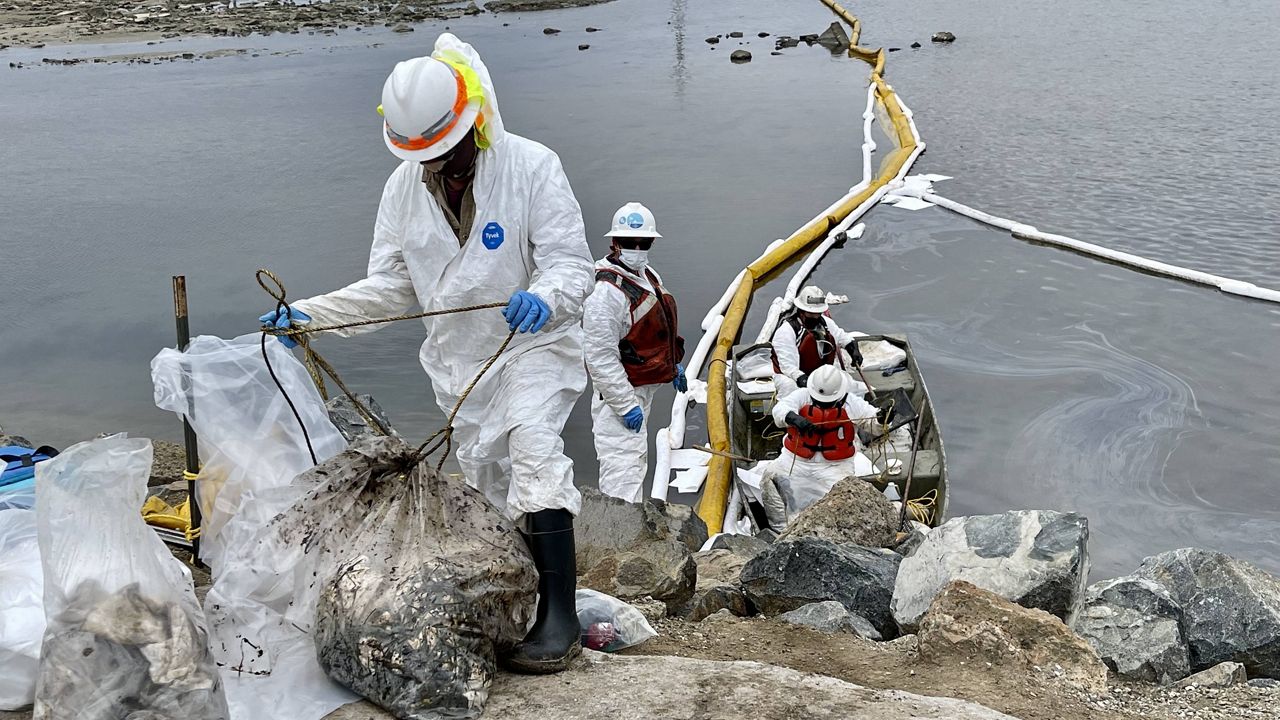HUNTINGTON BEACH, Calif. (CNS) — Environmental advocates Saturday criticized the federal government’s decision to grant a permit for underwater repairs that they say will allow the restart of a 42-year-old pipeline that ruptured off Orange County in Oct. 2021, releasing thousands of gallons of oil into the Pacific Ocean.
The U.S. Army Corps of Engineers issued a permit on Friday authorizing “regulated activities associated with the San Pedro Bay Pipeline Repair Project - Permanent Reconstruction Activities.”
Last year’s spill was one of the largest in California in recent years, covering more than 8,000 acres. Beaches were closed for days, and the oil killed or injured thousands of birds and other marine wildlife and led to expensive cleanup efforts. The source was a damaged pipeline connecting Platform Elly to Long Beach.
“The Biden administration just ramped up the risk of yet another ugly oil spill on California’s beautiful coast,” said Brady Bradshaw, a senior campaigner at the Center for Biological Diversity’s oceans program. “Unfortunately, people living near offshore drilling infrastructure are all too familiar with this abusive cycle of drill, spill, repeat. We need to quickly phase out all dangerous, failing offshore oil infrastructure, not issue more permits that invite the next disaster.”
Garry Brown, founder and president of Orange County Coastkeeper, said last year’s “devastating spill is still fresh in the minds of Orange County residents. As we witnessed firsthand, the deteriorating and unproductive platforms off Southern California’s coast are a constant risk to the health of humans and wildlife. It is well past time to decommission California’s offshore oil and gas infrastructure, and this irresponsible permit is a step in the wrong direction.”
Attempts to reach officials at the Army Corps of Engineers for comment were not successful.
Earlier this week, the Center for Biological Diversity filed a lawsuit in Los Angeles federal against the Bureau of Ocean Energy Management for allegedly failing to review decades-old plans for offshore oil platforms near Huntington Beach.
The filing alleges that the BOEM has allowed Platform Elly and other rigs in the Beta oil field to continue operating while relying on drilling and safety plans that were written and approved in the 1970s and 1980s.
“These outdated plans don’t account for the rapidly aging oil industry infrastructure off California’s coast,” said Kristen Monsell, legal director of the center’s oceans program. “With these decaying rigs out there, we’re rolling the dice every day. Our coastal communities and wildlife can’t afford to wait for the next disastrous oil spill while the federal government does nothing. It’s time to get these rusty relics out of our ocean.”
A BOEM representative said the agency does not comment on pending litigation.
Amplify Energy Corp., which operates the pipeline that ruptured last year, pleaded guilty last month along with two of its subsidiaries to violating the federal Clean Water Act.
In a plea agreement with federal prosecutors, Amplify and its subsidiaries Beta Operating Co. and San Pedro Bay Pipeline Co. pleaded guilty to a misdemeanor count of negligently discharging oil into San Pedro Bay.
U.S. District Judge David Carter sentenced the company to pay a $7.1 million fine and $5.8 million to reimburse the Coast Guard for expenses from the Oct. 2021 spill.
In addition to the fines and fees, the companies would also spend four years on probation and would be required to make a series of operational changes, including improved training, installation of a new leak-detection system and meeting notification requirements, according to the U.S. Attorney’s Office.
In a statement, Amplify President/CEO Martyn Willsher said the company has ensured from the start that it was “working cooperatively with the various agencies investigating this incident.”
“We believe this resolution, which is subject to court review and approval, reflects the commitments we made immediately following the incident to impacted parties and is in the best interest of Amplify and its stakeholders,” he said. “We are committed to safely operating in a way that ensures the protection of the environment and the surrounding communities.”



